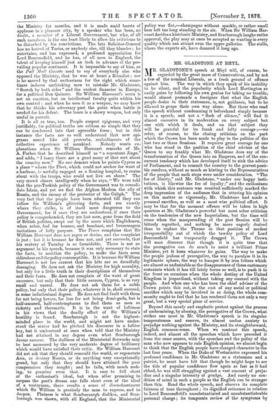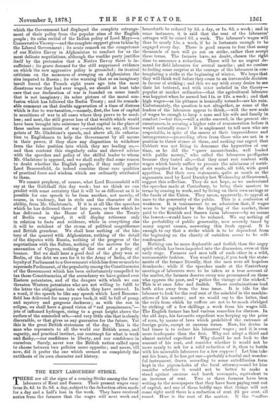MR. GLADSTONE AT RHYL.
MR. GLADSTONE'S speech at Rhyl will, of course, be regarded by the great mass of Conservatives, and by not a few of the nominal Liberals, as a fresh ground of offence against him. The way in which they speak of his inability to be silent, and the popularity which Lord Hartington so easily gains by following his own genius for taking no trouble, would almost persuade a foreigner that what the English people desire in their statesmen, is, not guidance, but to be allowed to grope their own way alone. But those who read the speech without condemning it beforehand simply because it is a speech, and not a "flash of silence," will find it almost excessive in its moderation on every subject but one with which it deals, and on that subject they will be grateful for its frank and lofty courage ;—we refer, of course, to the closing criticism on the part which the Crown has been made to play in the politics of the last two or three Sessions. It requires great courage for one who has stood in the position of the chief adviser of the Queen to say frankly what Mr. Gladstone does say of the transformation of the Queen into an Empress, and of the con- current tendency which has developed itself to sink the advice of Parliament, and to commit the country to the gravest possi- ble resolves, without so much as hinting to the Representatives of the people that such steps were under consideration. "The foe of liberty," said Mr. Gladstone, "under our happy insti- tutions, is likewise the foe of loyalty ;" and the enthusiasm with which this sentence was received sufficiently marked the deep impression of the audience that in uttering his opinion on this matter so vigorously, Mr. Gladstone had made a personal sacrifice, as well as a most wise political effort. It may be that for the moment offence will be taken in high quarters at Mr. Gladstone's powerful but most sober criticism on the tendencies of the new Imperialism, but the time will come when the masquerading of the past Session will be bitterly regretted, and nothing be more eagerly desired than to replace the Throne in that position of modest irresponsibility out of which the tawdry policy of Lord Beaconsfield has temporarily dragged it. The Crown will soon discover that though it is quite true that the prerogative can do much to assist a brilliant Prime Minister, yet it loses whatever he gains. The way to make the people jealous of prerogative, the way to paralyse it in its legitimate sphere, the way to hamper it by iron fetters which are almost as undesirable as the disappearance of those customary restraints which it has till lately borne so well, is to push it to the front on occasions when the whole destiny of the United Kingdom is jeopardised, without taking any counsel with the people. And when one who has been the chief adviser of the Crown points this out, at the cost of any social or political sacrifice which may be involved in so doing, the whole com- munity ought to feel that he has rendered them not only a very great, but a very special piece of service.
Beyond this manly and emphatic protest against the process of undermining, by abusing, the prerogative of the Crown, what strikes one most in Mr. Gladstone's speech is its singular temperateness and reserve, its almost undue anxiety to prejudge nothing against the Ministry, and its straightforward, English common-sense. When we contrast this speech, indeed, and almost all the speeches which have preceded it from the same source, with the speeches and the policy of the man who now appears to rule English opinion, we almost begin to think that the English people have changed character in the last four years. When the Duke of Westminster expressed his profound confidence in Mr. Gladstone as a statesman and a patriot, he must have felt that though he might hope to see the tide of popular confidence flow again as fast as it had ebbed, he was still struggling against a vast amount of preju- dice and a singular intensity of grudge. And surely no con- dition of mind in such a people as the English can be stranger than this. Read the whole speech, and observe its complete fairness of tone throughout ; its dignified reticence in relation to Lord Beaconsfield's unsubstantiated and unsubstantiateable personal charge ; its temperate review of the symptoms by
which the Government had displayed the complete estrange- ment of their policy from the popular aims of the English people ; its calm recital of the Indian policy of Lord Mayo—a Conservative Viceroy—and the complete support given to him by the Liberal Government ; its acute remark on the competence of our Native Envoy in Afghanistan to conduct for us the most delicate negotiations, although the warlike party justifies itself by the pretension that a Native Envoy there is in- sufficient ; its grave demand for the still suppressed evidence on which the new aggressive policy is grounded ; its Ironical criticism on the meanness of avenging on Afghanistan the sins imputed to Russia ; its wise warning that as an imaginary insult forced the French eight years ago into the most disastrous war they had ever waged, we should at least take care that our declaration of war is founded on some insult that is not imaginary ; its sober picture of the moral con- fusion which has followed the Berlin Treaty ; and its remark- able comment on that double aggravation of a time of distress which is due to war-taxation,—namely, first, the loss of capital in munitions of war in all cases where they prove to be need- less; and next, the still graver loss of that wealth which would have been brought into existence by that capital in the place of these useless munitions of war ;—consider, we say, all these points of Mr. Gladstone's speech, and above all, its exhorta- tion to Englishmen to help the Government by all means in their power, if they show any disposition to withdraw from the false position into which they are leading us,— and then contrast this singularly calm and shrewd advice with the speeches and policy of the skilful leader to whom Mr. Gladstone is opposed, and we shall really find some reason to doubt whether the English people, if they really prefer Lord Beaconsfield, do indeed combine those rare qualities of practical force and wisdom which are ordinarily attributed to them.
We cannot prophesy, of course, what Lord Beaconsfield will say at the Guildhall this day week ; but we think we can predict with some certainty that it will be as different as it is possible for one speech to be from another, not merely, of course, in tendency, but in style and the character of its ability, from Mr. Gladstone's. If it is at all like the speeches which he has delivered there of late years, or those which he has delivered in the House of Lords since the Treaty of Berlin was signed, it will display reticence only in relation to facts and evidence, while in everything else it will be redolent of the steam of political magnificence and British grandeur. We shall hear nothing of the his- tory of the quarrel with Afghanistan, nothing of the detail of the disputes with Russia, nothing of the progress of the negotiations with the Sultan, nothing of the motives for the annexation of Cyprus, nothing of the cost of a policy of bounce. But we shall hear a good deal of the glory won at Berlin, of the debt we owe for it to the Army of India, of the loyalty of Parliament to a Government which has done so much to supersede Parliament, of the popularity among the Constituencies of the Government which has been unfortunately compelled to tax those Constituencies, of the ascendancy we have gained over Eastern potentates, and of the dangers with which we can threaten Western potentates who are not willing to fulfil to the letter the obligations into which they have entered. In a word, if the speech be like any speech which Lord Beacons- field has delivered for many years back, it will be full of pomp and mystery and gorgeous darkness ; as with the sun in eclipse, we shall have a grand vision of "red prominences,"— jets of inflamed hydrogen, rising to a great height above the surface of the concealed orb,—and very little else that is clearly discernible, or that gives us any guarantee for the future. Yet this is the great British statesman of the day. This is the man who represents to all the world our British sense, and sagacity, and practical instinct, our contempt for what is weak and flashy,—our confidence in liberty, and our confidence in ourselves. Surely, never was the British nation called upon to choose between two policies more opposite ; and never, till now, did it prefer the one which seemed so completely the antithesis of its own character and history.



































 Previous page
Previous page